Table of content
- Coffee Consumption and Blood Sugar in Diabetes
- Potential Benefits of Coffee for People with Diabetes
- Increased Risks of Coffee for People with Diabetes
- Coffee Before Blood Sugar Testing
- Coffee Types and Their Impact on Blood Sugar
- Coffee Creamers: Choosing the Right Option
- Best Creamer Options for Diabetics
- Coffee Creamer Options and Blood Sugar Impact
- Other Alternative Beverages for Diabetes
- Tips for Safe Coffee Consumption in Diabetes
- Conclusion
- Frequently Asked Questions
Coffee is one of the most popular drinks in the world, including among people who are living with diabetes. It is interesting to know that 12.6% of the world’s population, or over 1 billion people, drink coffee daily. This statistic is based on the global population of 8 billion as of 2023/2024. If we talk about diabetes, its effects on blood sugar depend on various things like the type of coffee, the preparation of coffee, and the patient’s profile.
In this blog, we explore the relationship between coffee and diabetes, focusing on the safest coffee and creamer choices for diabetic patients. Get an evidence-based review of coffee consumption, diabetes-friendly creamers that are safe, and important clinical considerations.
Coffee Consumption and Blood Sugar in Diabetes
Many patients often ask their doctors whether coffee is safe or ok for people with diabetes. The answer is not universal. Coffee has both advantages and disadvantages, which depend on the situation. Situations like which type of coffee do you use, and how do you prepare your coffee and also depend on the patient profile, whether the patient is managing type 1 or type 2 diabetes. Some important considerations include
- Coffee contains antioxidants like chlorogenic acid, which may improve how your body uses insulin.
- For some people, caffeine may raise both blood sugar and blood pressure.
- The effect also changes depending on what you drink, like black coffee, decaf, or instant coffee.
Potential Benefits of Coffee for People with Diabetes
1. Antioxidants in Nature
Coffee is rich in antioxidants, which may help reduce inflammation and protect against insulin resistance—a key factor in developing type 2 diabetes. Regular antioxidant intake may support overall metabolic health and lower long-term diabetes risk.
2. Contains Chlorogenic Acid
Chlorogenic acid, a bioactive compound in coffee, has been shown to improve glucose metabolism, enhance insulin sensitivity, and reduce the post-meal rise in blood sugar. This effect may contribute to a lower risk of developing type 2 diabetes.
3. Support Moderate Consumption:
Research suggests that moderate coffee consumption—up to 3–4 cups per day—can be associated with a reduced risk of type 2 diabetes. Moderate intake may also help improve cognitive function and provide cardiovascular benefits.
4. Additional Benefits (Not Always Highlighted):
- Liver Health: Coffee consumption is linked to better liver function, which is important for glucose regulation.
- Gut Microbiome Support: Certain compounds in coffee may positively affect gut bacteria, indirectly supporting blood sugar balance.
- Weight Management: Coffee can enhance metabolism slightly and may help with appetite regulation, contributing to healthier body weight.
- Mood and Energy: Moderate coffee intake may improve energy and focus, which can help people stick to healthy routines and exercise—key factors in diabetes management.
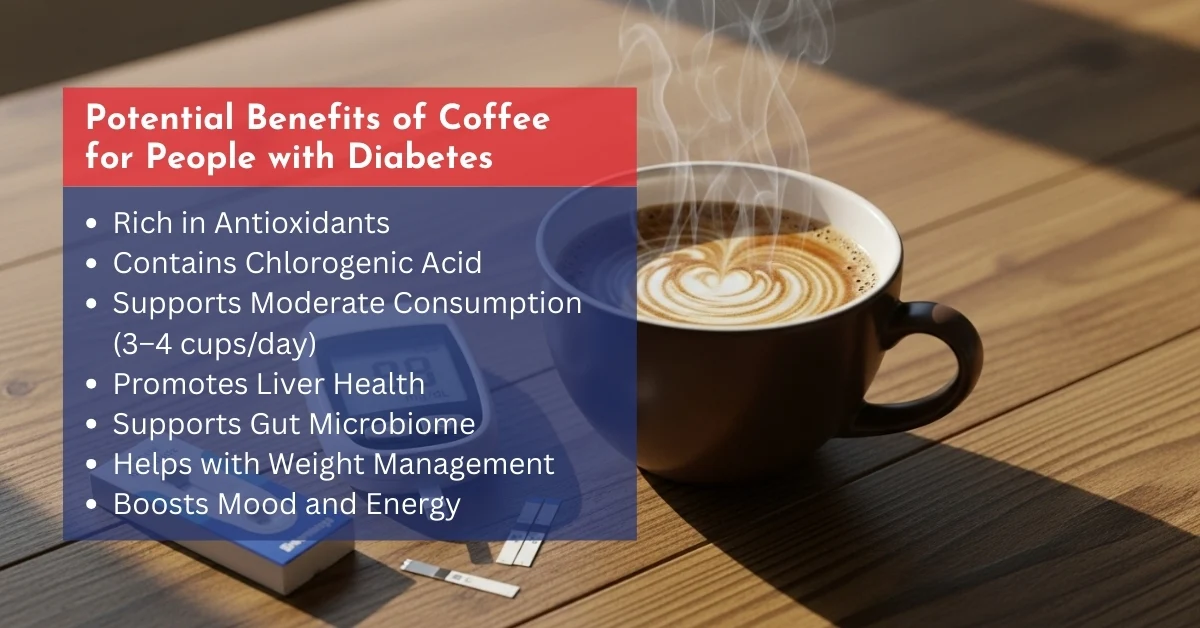
Increased Risks of Coffee for People with Diabetes
1. Caffeine (Blood Sugar Spikes)
Caffeine can temporarily raise blood sugar levels and may also affect insulin sensitivity in some individuals. For people with diabetes, this means blood sugar spikes could be more pronounced after drinking caffeinated coffee. Additionally, high caffeine intake may increase heart rate and blood pressure, which are important factors to monitor for those with cardiovascular risk.
2. Sugars and Additives
Many store-bought or speciality coffee drinks contain high amounts of sugar, syrups, and artificial sweeteners, which can significantly raise blood glucose levels. Even seemingly small amounts of flavoured syrups can impact blood sugar over time. Choosing unsweetened options or low-calorie creamers can help manage these risks.
3. Other Considerations
- Artificial Sweeteners: Some sugar substitutes may still trigger a minor insulin response in sensitive individuals.
- Milk and Dairy: High-fat or sweetened dairy can slow digestion, sometimes causing delayed blood sugar spikes.
- Timing with Meals: Drinking coffee on an empty stomach may affect glucose metabolism differently than consuming it with a meal.
- Medication Interactions: Caffeine may interact with certain diabetes medications, affecting how quickly they work.
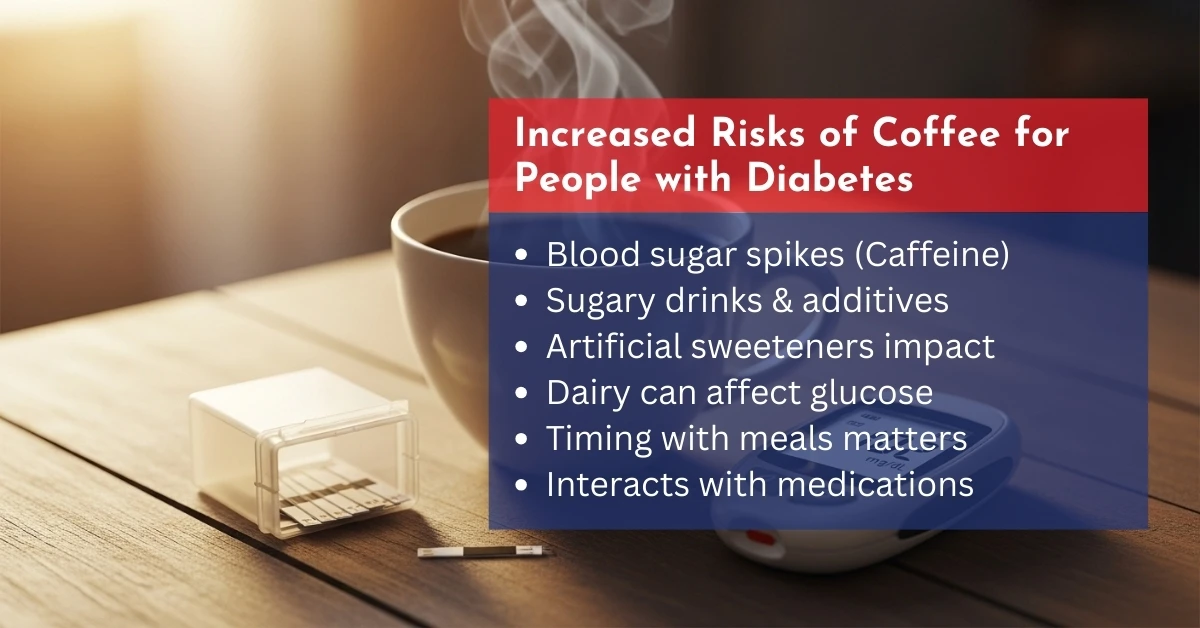
Coffee Before Blood Sugar Testing
If you’re heading in for a fasting blood sugar test, skip the coffee.
- Even black coffee can make your results 10-15% higher.
- According to the ADA, you should avoid all food and drinks, including coffee, for 8-12 hours before your test.
Coffee Types and Their Impact on Blood Sugar
| Coffee Type | Calories & Carbs | Impact on Blood Sugar | Best for Diabetics? |
| Black Coffee | 0 | Neutral; mild spike in some | Yes, in moderation |
| Decaf Coffee | ~2 | Minimal effect | Best for caffeine-sensitive |
| Instant Coffee | 2-5 | Depends on brand/ingredients | Check the label |
| Cold Brew | 2–5 | Lower acidity; caffeine may still spike sugar | Good if unsweetened |
Coffee Creamers: Choosing the Right Option
While black coffee may be harmless, coffee creamers for diabetics present more concern. Creamers mostly contain sugar, fats and flavor, which is not good for diabetics.
- Sweetened coffee creamers can cause a quick rise in blood sugar
- Patients should look for diabetic creamer options with low sugar and low glycemic impact.
- The best coffee creamer for diabetics includes sugar-free, low-carb, or plant-based varieties.
Coffee and creamers may raise blood sugar in some diabetic people but not in others. With CGMs like the FreeStyle Libre 2 Plus Sensor, FreeStyle Libre 3 Plus Sensor, or Dexcom G7 Starter Kit, you can track changes in real time.
Best Creamer Options for Diabetics
The best diabetic coffee creamer choices for diabetic patients are given below:
- Nutpods: This is unsweetened creamer, which has 0 grams of sugar.
- In Almond or coconut milk creamers, which contain no sugar
- Heavy cream that is diluted with water has low carbs, but the fat is high
- Splenda zero-sugar creamer or Elmhurst unsweetened oat creamer.
Avoid those creamers that are flavored with 5+ grams of sugar per serving.
Coffee Creamer Options and Blood Sugar Impact
| Creamer Type | Sugar & Carbs | Effect on Blood Sugar | Best For Diabetics? |
| Flavored Creamers | High sugar, 5-10g carbs per serving | Rapid spike in glucose | Avoid |
| Half-and-Half | ~1g carb per tbsp (lactose) | Mild increase | Use in moderation |
| Milk (Whole/Skim) | 1-2g carbs per tbsp | Moderate rise | Better in small amounts |
| Unsweetened Almond Milk | <1g carb per serving | Minimal impact | Excellent choice |
| Unsweetened Coconut Milk | <1g carb per serving | Minimal impact | Excellent choice |
| Keto/MCT Creamers | 0-1g carb per serving | Stable glucose may boost satiety | Great for low-carb diets |
Other Alternative Beverages for Diabetes
If you don’t like coffee, that’s ok, there are many other drinks you want to try. Many people don’t like coffee; they always wonder, Can we drink hot chocolate? The answer is no because it contains too much sugar, which is not good for you. But the good news is that sugar-free cocoa, which contains zero sugar and fats, is the best option for you. The other drinks, like herbal teas, chicory coffee, or even matcha, are refreshing drinks you can enjoy these drinks without any worry. If we talk about coffee, it has some benefits, like improving your insulin sensitivity and moderation. All these drinks are best for you without taking any risk.
Tips for Safe Coffee Consumption in Diabetes
For patients who are diabetic should drink coffee, the following strategies are essential:
- Monitor your blood sugar after drinking coffee, and adjust your diet or medication if needed to stay in control.
- Use stevia or monk fruit because they are diabetic-friendly sweeteners instead of using sugar
- Avoid using creamers that have flavored syrups and high sugar
- Take 3-4 cups of coffee daily.
- Opt for unsweetened or low-sugar coffee to keep blood sugar stable.
- Limit store-bought or specialty coffee drinks, as they often contain high sugar and extra additives.
- Always remember diabetic patient should take coffee without sugar, cream, or any fat.
Thus, the answer to can a diabetic drink coffee is yes, provided it is consumed thoughtfully and in moderation.
Conclusion
The coffee is the best option for you if you are managing diabetes because it can balance your diet. Yes, diabetics can enjoy coffee, but the secret is moderation, choosing sugar-free creamers, and keeping an eye on blood sugar. With the right choices, your morning coffee can stay both enjoyable and safe. Coffee is good for diabetes is possible when blood sugar is closely monitored.
You can drink coffee if you are a diabetic patient, but only when you make it with healthy creamers and practice mindful consumption. Among using all options, the best thing is you take unsweetened, plant-based creamers, which are low in carbohydrates when you make coffee.
Coffee can be part of a diabetes-friendly lifestyle if consumed in moderation and without sugary add-ins. At CGM monitors, we want to help you make sound and sustainable decisions. With the best diabetic devices, you will make your life easy without any complications.
Frequently Asked Questions
Can diabetics have coffee creamer?
Yes. People with diabetes can use coffee creamer, but it’s important to pick sugar-free, low-carb, or plant-based creamers. Regular flavored creamers with added sugar can quickly raise blood glucose levels.
What can diabetics put in their coffee?
Safer options for people with diabetes include unsweetened almond milk, soy milk, oat milk, or sugar-free creamers. For sweetness, natural low-glycemic options like stevia or monk fruit are better than regular sugar.
Is coffee with creamer unhealthy?
Not always. Coffee with creamer can be part of a diabetes-friendly diet if the creamer is unsweetened, sugar-free, or plant-based. Sweetened creamers with added sugar and high saturated fat are less healthy for people managing diabetes.
What is the healthiest creamer to put in your coffee?
The healthiest creamer for diabetics is usually unsweetened almond milk, coconut milk, or sugar-free plant-based creamers. These options are low in carbohydrates and won’t cause sudden blood sugar spikes.
Does Coffee Mate creamer have a lot of sugar?
Yes. Most Coffee Mate creamers, especially flavored ones like French Vanilla, contain added sugars. Even a small serving may add several grams of sugar, which can raise blood glucose levels.
Does half and half raise blood sugar?
Yes, but only a little. Half and half contains natural lactose (milk sugar), so it can raise blood sugar slightly. The effect is usually smaller than with sweetened creamers, but it’s best to use it in moderation.
Does coffee with milk raise blood sugar?
Yes. Regular milk has natural lactose sugar, which can increase blood glucose. For a lower-carb option, try unsweetened almond milk or unsweetened soy milk, which are gentler on blood sugar.

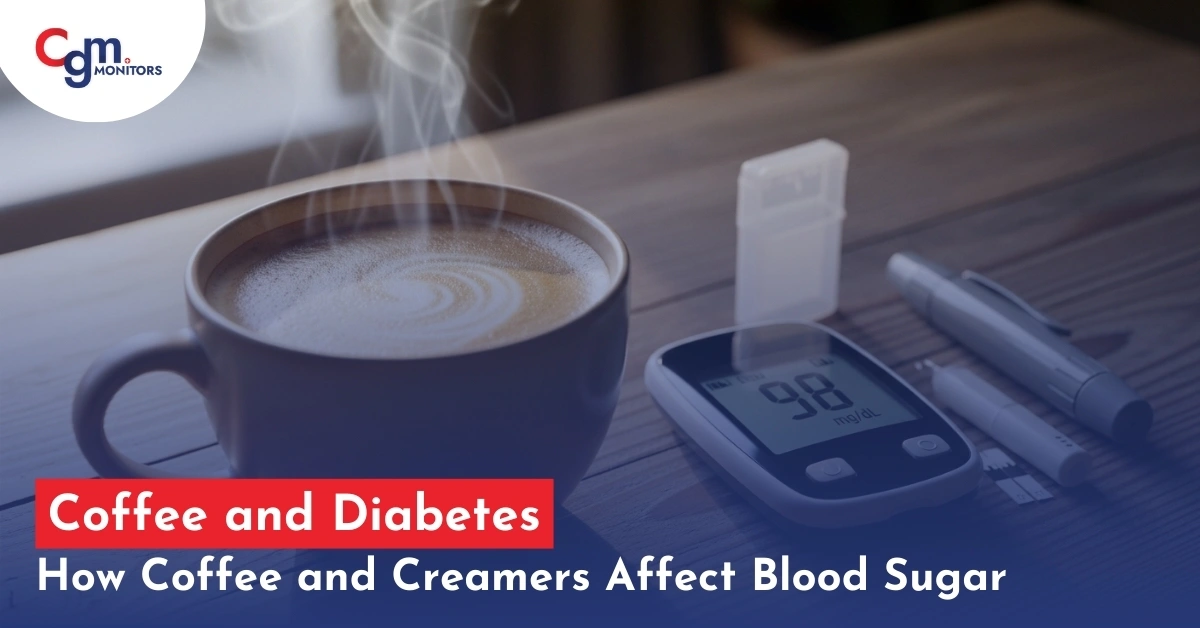



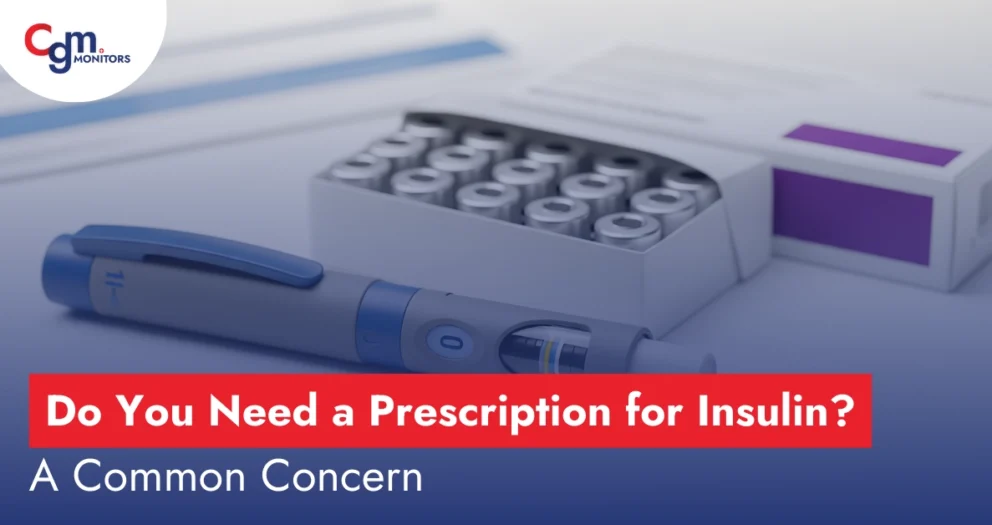
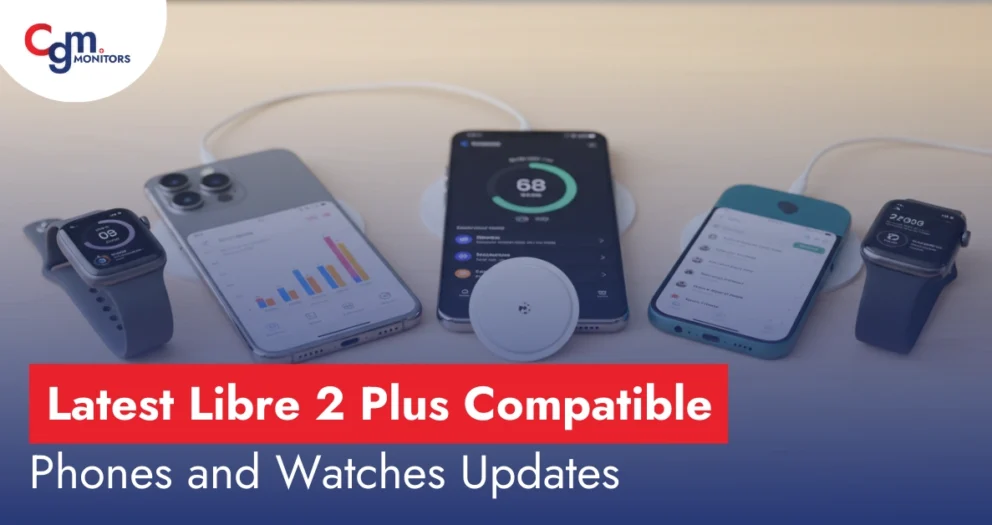
Write a comment
Your email address will not be published. All fields are required